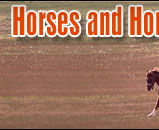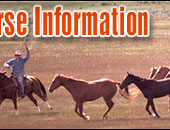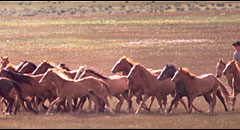 |
   |
|
|
|
You are here: > Horses > Horse health > Bowed tendons |
Bowed Leg Tendons In Horses: Signs, Repair and Care
Have you noticed your horse is in pain? Is it favoring one
leg? Is the back of the leg swollen, and perhaps hot and
tender to the touch? If so, your horse quite possible has a
bowed tendon. When viewed from the side, the cannon bone
area may actually resemble an archer’s bow instead of being
straight. The good news is the fact that the injury will
heal. The bad news is that the healing process is slow and –
depending on the severity of the injury - the risk of
re-injury is high. |
|
|
Many times, a tendon will become injured when the horse puts
more force onto its leg than the tendon can bear. This may
be due to accidentally positioning its leg improperly with
respect to the fluidity of the horse’s movement in
connection with its weight. Or, it may be due to improper
shoeing. Uneven footing is often cited when discussing bowed
tendons. As the incident occurs, some of the material that
comprises the tendon will rip and cause a buildup of damaged
cell fluid inside the tendon. If blood vessels |
 were torn as well, then blood will be added to the fluid
mixture. Veterinarians are able to diagnose torn tendons
with the help of an ultrasound, where the fluid buildup
presents as a hole. In veterinary medicine this condition is
referred to as a core lesion. With the help of the
ultrasound, the veterinarian is actually able to survey the
fiber patterns of the harmed tendons, and steps for resting
the horse can be taken before more damage is done.
Additionally, the healing process is measurable, and the
horse owner no longer has to rely on her or his sense of
touch to ascertain the level of healing. In the past, such
guesswork led to re-injury and quite often required even
more extensive care and rest than before. were torn as well, then blood will be added to the fluid
mixture. Veterinarians are able to diagnose torn tendons
with the help of an ultrasound, where the fluid buildup
presents as a hole. In veterinary medicine this condition is
referred to as a core lesion. With the help of the
ultrasound, the veterinarian is actually able to survey the
fiber patterns of the harmed tendons, and steps for resting
the horse can be taken before more damage is done.
Additionally, the healing process is measurable, and the
horse owner no longer has to rely on her or his sense of
touch to ascertain the level of healing. In the past, such
guesswork led to re-injury and quite often required even
more extensive care and rest than before.
The body will seek to heal itself quickly by causing
fibroblasts to produce cells – tenocytes - that will repair
the torn tendon. Yet because these cells differ from the
torn cells in flexibility and elasticity, a different kind
of collagen becomes the new support substance. The healing
process actually causes stiffness in the animal as well as a
shortened tendon, and the end-result is a less flexible,
thickened tendon. It only makes sense that such a tendon is
more susceptible to re-injury than a tendon that was never
torn.
The advance of veterinary medicine has seen the introduction
of a new drug, referred to simply as BAPN-f, which has been
used successfully in humans to treat scarring. Distilled
from the seeds of the sweet pea plant, an injection of this
drug is able to prevent the formation of scar tissue. In
conjunction with this injection, a concise exercise program
must be followed to help the horse heal gradually. Your
veterinarian will use ultrasound exams to keep an eye on the
healing process. Yet even so, the road to well being will
most likely take ten months or more, and as you may imagine,
it does involve not only an investment of time, but also of
money.
It should be stated that an ounce of prevention is more
desirable than a pound of cure. You can greatly decrease
your horse’s odds of falling victim to this injury by
demanding good trimming and shoeing, keeping an eye on the
overall health of the hooves, properly conditioning the
animal prior to strenuous work or exercise, and learning to
see the signs that denote that your animal has reached its
peak, and is beginning to tire.

|
Read the next horse health tips article on Equine Broken Bones. |
|
|
|
|
 |
|
|
|
|
|
Horse Education
|
|
|
|
|
Horse Information Topics
|
|
|
|
|
|
|
|
Horse Business Owners
|
| |
Advertise with Us
Have your horse products or services exposed to over 27,000 of our monthly visitors.
|
|
|
|
|
|